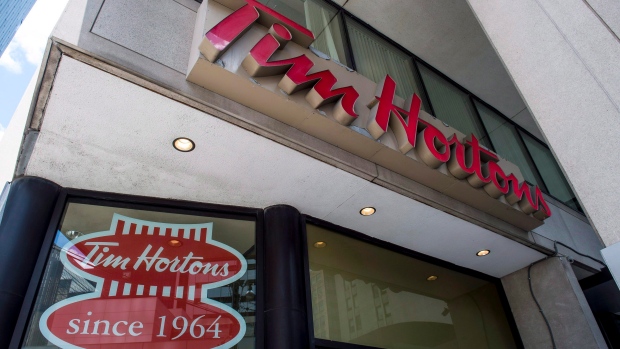Aug 2, 2017
Tim Hortons franchisees blast RBI over ‘lacklustre’ quarter

A second consecutive quarter of declining same-store sales at Tim Hortons helped send Restaurant Brands International to a second-quarter revenue miss, and fired up tension with the doughnut and coffee chain’s franchisees.
The company, which also counts Burger King and Popeyes Louisiana Kitchen among its stable of quick-service restaurants, saw sales at Tim Hortons locations open at least a year fall 0.8 per cent in the quarter, offsetting a larger than expected gain at Burger King.
Restaurant Brands’ adjusted profit rose to 51 cents U.S. per share in the second quarter on US$1.13 billion in total revenue. Analysts, on average, expected 45 cents in adjusted earnings per share and US$1.15 billion in revenue.
Restaurant Brands has been entirely reliant on opening new Tim Hortons locations to increase overall revenue in recent quarters, with the number of restaurants increasing more than four per cent over the course of the last year, though overall sales growth has lagged the rate of new location growth.
- Tim Hortons franchisees form alliance in U.S. amid 'disintegrated' trust in RBI
- Tim Hortons franchisee seeking class action lawsuit against Restaurant Brands
- Restaurant Brands CEO says he's willing to hear complaints from Tim Hortons franchisees
READ MORE
The latest same-store sales figures have drawn renewed ire from aggrieved franchisees, who lambasted management over the second-quarter decline. In a statement emailed to BNN, Dave Hughes, president of the Great White North Franchisee Association, called for wholesale changes to the company’s management style.
“The lacklustre quarterly earnings [Restaurant Brands] announced this morning are just one more indication that RBI needs to adjust the methods they employ in managing the various organizations under their umbrella,” Hughes wrote.
“While RBI continues to be profitable, the same cannot be said for Tim Hortons franchisees. RBI’s profits are at the expense of the store owners, who have been squeezed at every level of their operations by head office.”
The Great White North Franchisee Association represents about half of the chain’s Canadian franchisees, and last month filed a $500-million class action lawsuit over alleged declines in the quality of food management that Restaurant Brands is foisting upon them, among other complaints.
Though issues remain at home, Restaurant Brands is betting international expansion will help reverse Tim Hortons’ fortunes. The company announced Tuesday that it is bringing the nameplate to Spain, forming a joint venture with an unidentified party to launch Tim Hortons on the Iberian peninsula. The move follows Tim Hortons’ foray into the United Kingdom earlier this year.



